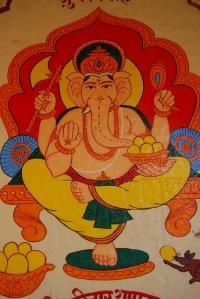 Coloro che giungono per la prima volta davanti alla porta della mia casa si meravigliano per la presenza di un occhio di Allah in ceramica, un rosso amuleto cinese, una casa degli spiriti thai e un portafortuna curdo fatto di ceci e velluti.
Coloro che giungono per la prima volta davanti alla porta della mia casa si meravigliano per la presenza di un occhio di Allah in ceramica, un rosso amuleto cinese, una casa degli spiriti thai e un portafortuna curdo fatto di ceci e velluti.
Si può facilmente intuire il mio interesse per le divinità e le superstizioni degli altri popoli, il più delle volte circondate da una storia tanto affascinante e coinvolgente da spingermi a portarne un po’ con me.
In Rajasthan, per la maggior parte di religione induista, sono rimasta colpita da Lord Ganesh, meglio conosciuto come il Dio Elefante. Nato dall’unione tra Shiva e Parvati nel quarto giorno del mese di Bhadrapat – il sesto mese del calendario lunare induista – è necessario chiedere la sua benedizione prima di gettare le fondamenta di una casa o di iniziare una nuova attività.
Una delle tante leggende, che narrano dell’origine della sua famosa testa di elefante, dice che Parvati, essendo molto orgogliosa del bel viso del pargolo, chiese a Saturno di dargli uno sguardo. Successe però che appena questi guardò il bimbo, gli ridusse il volto in cenere. Brahma, il creatore dell’Universo, disse allora a Parvati di sostituire la testa del bambino con quella del primo essere che le fosse capitato sotto mano per farlo tornare a vivere. La prima testa che la madre addolorata trovò fu quella di un elefante.
Il veicolo attraverso cui Ganesh si manifesta è il topo, che, a differenza sua, è in grado di passare attraverso ogni piccolo passaggio e simboleggia la capacità del Dio di superare ogni ostacolo. Questo è uno dei motivi per cui i topi sono considerati sacri e ad essi sono dovuti molti onori all’interno del Tempio di Deshnoke.
Lord Ganesh ha due mogli, Siddhi (successo) e Ridhi (prosperità): adorando il Dio automaticamente si entra nelle grazie delle sue consorti.
E’ abitudine onorarlo durante le cerimonie religiose, ma anche quotidianamente cercando la sua benedizione. Viene infatti raffigurato sulla carta da lettere, sulle prime pagine di un libro, all’ingresso delle case e dei negozi.
Ganesh rappresenta l’unione del microcosmo con in macrocosmo, della goccia d’acqua con l’oceano, dell’anima singola con la divinità e se vi dovesse capitare di trovarvi in mezzo ad una chiassosa marea umana, potrebbe essere il giorno del suo compleanno.
For all the Gods
Those who arrive first at the door of my house are amazed by the presence of a ceramic eye of Allah, a red Chinese amulet, a Thai spirit house and a good luck Kurdish charm made of chickpea and velvets.
You can easily guess my interest in the gods and the superstitions of other peoples, most often surrounded by a history as fascinating and compelling it prompted me to bring a little ‘with me.
In Rajasthan, for the most part of Hindu religion, I was struck by Lord Ganesh, better known as the Elephant God. Born from the union between Shiva and Parvati in the fourth day of Bhadrapat – the sixth month of the Hindu lunar calendar – you need to ask for his blessing before laying the foundations of a house or start a new business.
One of the many legends that tell about the origin of his famous elephant head, says that Parvati, being very proud of the beautiful face of the little child, asked Saturn to give him a look. It happened, however, that as soon as he looked at the baby’s face reduced to ashes. Brahma, the creator of the universe, then said to Parvati to replace the baby’s head with the first she could find to come him back to life. The first one the mother found was of an elephant head.
The vehicle through which Ganesh manifests is the mouse, which, unlike his, is able to pass through each small passage and symbolizes the ability of God to destroy any obstacle. This is one reason why the rats are considered sacred and they are due to many honors in the Temple Deshnoke.
Lord Ganesha has two wives, Siddhi (success) and Ridhi (prosperity): worshiping the God automatically enters you into the good graces of his wives.
It’s an habit honor him during religious ceremonies, but also every day looking for his blessing. It is shown on the letterhead, on the first pages of a book at the entrance of houses and shops.
Ganesh is the union of the microcosm in the macrocosm, the water drop with the ocean, individual soul with the divinity, and if happen to you to be in the middle of a rowdy human tide, could be the day of his birthday.







